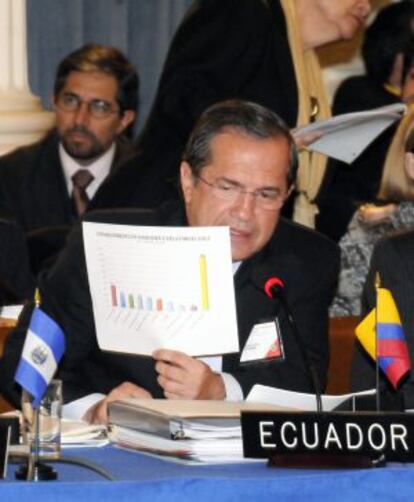OAS closes process to reform human rights system with lukewarm resolution
Member states agree to “continue dialogue” over changes to appease ALBA nations

The main purpose of last Friday’s special meeting of the Organization of American States (OAS) was to conclude a two-year process of reforming the group’s policies regarding the Inter-American System of Human Rights (ISHR) with the approval of a sweeping resolution. All of the OAS members had agreed to these changes, except for the leftist bloc of Ecuador, Venezuela, Nicaragua and Bolivia.
In an attempt to derail the OAS vote in adopting the resolution that didn’t include many of its initiatives, the Bolivarian Alliance for the Americas (ALBA) was able to win a commitment by the Permanent Council to “continue dialogue on key issues for strengthening the ISHR” after 12 hours of negotiations.
It was seen as a pyrrhic victory for the ALBA bloc since it had to abandon its push for changes to Inter-American Commission on Human Rights (IACHR) policies. The leftist nations have been wary in the way the IACHR – which implements ISHR policies – is funded, accusing the United States and other countries of using the body through financial levers to criticize and attack their governments.
After Ecuador threatened to abandon the system late Friday night, Argentina presented an amendment to the resolution that put the ALBA nations at ease – it will extend discussions on reforms at least until June. With this amendment, Argentina prevented the OAS from passing the original text in a vote, which called for instant passage if the rest of the 30 members agreed.
With Argentina’s initiative, we feel that the proposals by the ALBA countries have been considered"
“With Argentina’s initiative, we feel that the proposals by the ALBA countries have been considered and we are willing to accept this consensus,” said Ecuadorian Foreign Minister Ricardo Patiño following the late-night meeting.
The inclusion of the Argentinean amendment is seen as “false closure” to the ISHR reform process. It leaves the door open to the possibility that the Permanent Council could order the General Assembly to come up with new revisions to the system, a process which for the past two years has prevented the OAS protection organ – the IACHR – from focusing exclusively on its work aimed at protecting victims of rights violations by their states.
It was also a bittersweet victory for ALBA. The OAS did not take into account any of the bloc’s demands that the leftist nations had been stubbornly calling for over the past few months. It wanted a different financing structure for the ISHR, new rules prohibiting the IACHR from ordering nations from issuing cautionary protection orders against governments, and changes to the body’s annual reports, which blacklist nations accused of violating civil liberties.
The OAS also sidelined ALBA’s last-minute petition to move the IACHR’s headquarters to another location outside Washington.
“What is important is not who wins the debate vote, but the fact that discussions have begun,” said Roy Chaderton, Venezuela’s ambassador to the OAS.
The OAS resolution offers a graceful exit for all its member states from a long and grueling process, which has caused geopolitical imbalances in the region, accompanied by threats from the ALBA bloc.
“Throughout this process it has become clear that some states want to weaken the ISHR,” said US Assistant Secretary of State for Western Hemisphere Affairs Roberta Jacobson after the close of the meeting. "The final agreement is not perfect, but we managed to raise the level of all rapporteurs, ensure the Commission’s autonomy, and guarantee its outside financing.”
ISHR funding has also been one of the main obstacles that prevented the OAS from reaching consensus in the past. According to the resolution, all nations agreed that ISHR should be funded solely by OAS funds and with contributions from its member states. The disagreement centered on how to distribute donations from third countries, until self-financing is achieved. At present, only 55 percent of the ISHR’s total budget comes from the OAS and its members.
The ALBA bloc sought to put conditions on contributions from third countries and outside institutions if they were not destined for any specific purpose, but that proposal was rejected by the other member States.
The ISHR received this decision with relief because, if the ALBA initiative had passed, it would have meant putting limits to autonomous funding as well as doing away with the Office of the Special Rapporteur for Freedom of Expression.
“This process didn’t achieve a true a strengthening of the ISHR,” said Viviana Krsticevic, executive director for the Washington-based Center of Justice and International Law.
“There is an undisputable majority of governments in the region that supported the process for reforming the SIDH. The resolution left open the possibility of dialogue, which we hope will be genuinely channeled in that direction,” she said in a statement.
Tu suscripción se está usando en otro dispositivo
¿Quieres añadir otro usuario a tu suscripción?
Si continúas leyendo en este dispositivo, no se podrá leer en el otro.
FlechaTu suscripción se está usando en otro dispositivo y solo puedes acceder a EL PAÍS desde un dispositivo a la vez.
Si quieres compartir tu cuenta, cambia tu suscripción a la modalidad Premium, así podrás añadir otro usuario. Cada uno accederá con su propia cuenta de email, lo que os permitirá personalizar vuestra experiencia en EL PAÍS.
¿Tienes una suscripción de empresa? Accede aquí para contratar más cuentas.
En el caso de no saber quién está usando tu cuenta, te recomendamos cambiar tu contraseña aquí.
Si decides continuar compartiendo tu cuenta, este mensaje se mostrará en tu dispositivo y en el de la otra persona que está usando tu cuenta de forma indefinida, afectando a tu experiencia de lectura. Puedes consultar aquí los términos y condiciones de la suscripción digital.








































